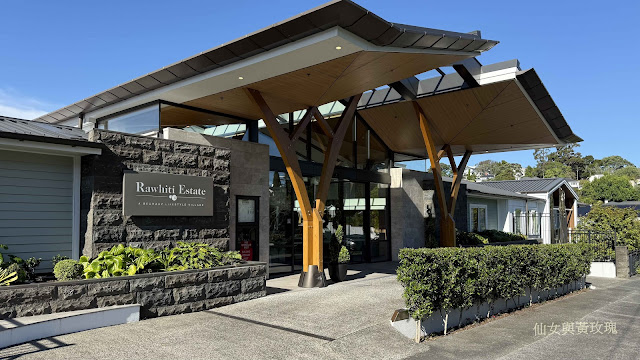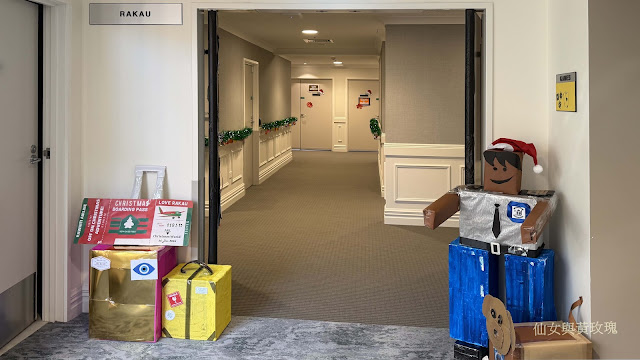I’ve known Des for almost 30 years. When I first arrived in New Zealand, we became neighbors. Their home was a typical countryside-style wooden house, nestled within a front and back garden. The exterior was simple, but the interior was warm and inviting, furnished with Victorian-era books and furniture. This gave the home not only a rustic charm but also a sense of timelessness.
Des originally worked in the shipping industry, while his sister was an employee at Air New Zealand. After retiring, they began creating their dream home. They filled their garden with their favorite trees and flowers, keeping it neat and vibrant year-round, often earning the admiration of passersby.Des and his sister Barbara are both warm-hearted individuals, always ready to lend a helping hand to neighbors. When we first arrived, they visited us and offered immense support. They brought over a stack of old magazines about the area, helping us understand the local history and culture. They assisted in tidying up our garden and trimming hedges, took us to rural farms to buy fresh produce, and introduced us to other neighbors. Thanks to them, we embarked on a new chapter of “life in a foreign land.”
Unfortunately, Barbara fell seriously ill and passed away, leaving Des heartbroken. It was then that we shifted from being cared for to becoming caregivers. However, he showed remarkable resilience and soon returned to his daily routines. Both the interior and exterior of his home remained tidy and beautiful. All I could do was occasionally prepare some meals or bake a few treats and desserts to offer a small gesture of support.
The one who showed Des the most affection was probably our dog, Pascal. During the day, Pascal often went over to keep him company and, on some nights, would even sneak through the hedges to knock on his door, staying with him through the long nights. Before Des moved into a retirement home, the two of them would frequently stroll around together, seeming to become the best of “companions.”
At the age of 80, Des finally decided to leave his home and move into a
retirement village in Epsom, one that required residents to be
“self-sufficient.” He lived in a bright, airy two-bedroom apartment on the
second floor and was enthusiastic about decorating his “new home.” Since the
new space was smaller than his old house, he could only bring a few simple
belongings and had to purchase new furnishings. He bought a custom-sized
refrigerator, picked out curtains, and ordered bespoke furniture, eventually
creating a cozy and comfortable space to settle in. Although he no longer had
to maintain a garden, he managed all other aspects of daily life independently.
(In case of emergencies or health issues, he could press a button to call for
staff assistance.)
Over the next sixteen years, Des often visited the house where he had lived for
70 years. His conversations were filled with bittersweet memories of the home
that had witnessed his life from childhood to old age, holding countless family
stories.
Last year, at the remarkable age of 96, Des drove to our house for coffee and a
chat. His sharp eyes and keen hearing belied his age—he had no need for
dentures or a cane. However, his conversations often lingered on “the past” and
sometimes repeated themselves. Nevertheless, we were delighted to see him in
such good health, full of energy, and still capable of independence. With great
determination, he even declared his dream of taking another cruise someday to fulfill
one more wish.
This year, however, a serious illness dashed Des’s dreams. One day, we received
a call from the retirement village in Epsom informing us that Des had been
transferred to the Rawhiti Estate retirement home in Remuera. Feeling anxious,
we rushed over to see him. When we arrived, we found him sitting there, his
eyes bright and his face beaming with a smile. He cheerfully told us that he
had safely returned from the brink of death. Seeing him back to his lively,
joyful self, chatting and joking, we finally breathed a sigh of relief.
The staff at the retirement home were busy putting up Christmas decorations, adorning the entire place beautifully and creating a joyful festive atmosphere. The communal activity spaces were spacious, well-equipped, and exuded warmth. Every small detail had been thoughtfully designed with the comfort and safety of elderly residents in mind.
The elderly residents each have their own private, clean suites, complete with a kitchen, refrigerator, wardrobe, and air conditioning. Meals, including breakfast, lunch, and afternoon tea, are provided daily. The estate also offers comprehensive healthcare services, including physical training, swimming, and hydrotherapy. With the attentive care Des receives, we feel much more at ease. We’re truly happy for him, knowing he can live in such a wonderful environment.
Postscript:
This boutique retirement village caters to all levels of living needs, from fully independent living to hospital-grade care. The facility includes 27 luxurious independent living apartments and 68 premium care rooms for rest home, dementia, and hospital-level care, offering an exceptional balance of lifestyle and continuum care. (Source: Rawhiti Estate official website)
Services for independent living residents include:
• Gardening and lawn maintenance of communal areas
• Repair and upkeep of communal spaces
• Care and medical services
• Transportation to suburban areas
• 24-hour security monitoring
• 24-hour emergency response services
• Exclusive access to all community facilities
Additional services like meal preparation, cleaning, and laundry are also available. (Source: Rawhiti Estate official website)
***This article was originally written in Chinese, but to make it accessible to those who do not understand Chinese, I specifically asked ChatGPT to translate it into English.








































沒有留言:
發佈留言